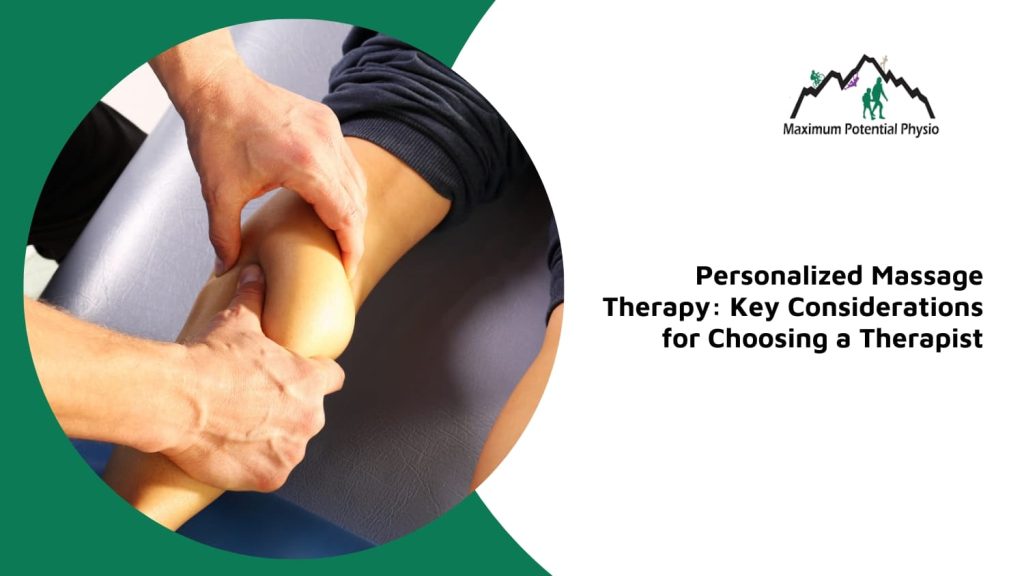Personalized Massage Therapy: Key Considerations for Choosing a Therapist

Choosing the right massage therapist is essential for ensuring a beneficial and relaxing experience that aligns with your health goals. Whether you're seeking relief from chronic pain, stress reduction, or simply a bit of pampering, selecting a qualified and compatible therapist can make all the difference. In this blog, we'll explore various factors to consider when choosing a massage therapist, including qualifications, techniques, and the importance of client reviews, to help you make an informed decision.
Qualifications to Look for in a Massage Therapist
When selecting a massage therapist, understanding their qualifications is crucial to ensure you receive safe and effective treatment. A well-qualified therapist will have the necessary training and credentials to address your specific needs.
- Certification and Licensing: Ensure the therapist is certified by a recognized body and holds a valid license in your region. This ensures they have met the educational and practice standards required in the field.
- Educational Background: Look for a therapist who has completed a comprehensive training program at a reputable institution. This typically includes anatomy, physiology, and hands-on massage techniques.
- Specializations: If you have specific needs, such as sports massage or prenatal massage, seek out therapists with additional training in those areas. Specializations indicate a deeper understanding and expertise.
- Experience: While newer therapists can be skilled, those with more years of practice may have a broader range of techniques and experience in dealing with various conditions.
- Ethical Practices: A therapist should uphold professional boundaries and maintain client confidentiality at all times.
Carefully evaluating a therapist’s qualifications can significantly impact your massage therapy experience.
What Types of Massage Techniques Should You Consider?
Different massage techniques offer unique benefits and can be tailored to individual needs. Understanding these techniques can help you choose the right type of massage therapy.
- Swedish Massage: A gentle technique that uses long strokes, kneading, and circular movements to relax and energize. It’s ideal for those new to massage therapy.
- Deep Tissue Massage: Targets deeper layers of muscle and connective tissue, beneficial for chronic pain and tension, particularly for back and neck issues.
- Sports Massage: Designed for athletes, this technique focuses on preventing injuries, improving flexibility, and enhancing athletic performance.
- Trigger Point Massage: Focuses on tight muscle fibres that can form in your muscles after injuries or overuse, providing relief from specific pain points.
- Hot Stone Massage: Involves the use of smooth, heated stones placed on certain parts of the body to loosen tight muscles and balance energy centers.
- Prenatal Massage: Tailored for expecting mothers, this technique helps reduce pregnancy discomfort, such as back pain and swelling.
Understanding the various massage techniques available can help you select a therapy that best suits your specific health needs and personal preferences.
The Importance of Client Reviews When Choosing A Massage Therapist
Client reviews and testimonials can provide valuable insights when choosing a massage therapist. They offer firsthand accounts of other clients' experiences, which can help you make an informed decision.
- Insight into Effectiveness: Reviews can highlight the therapist’s ability to provide effective treatment and relief, which is crucial in selecting a competent therapist.
- Professionalism and Conduct: Testimonials often comment on the therapist’s professionalism, punctuality, and demeanour, offering a glimpse into their work ethic.
- Client Satisfaction: Consistently positive reviews indicate a high level of client satisfaction and reliability, reassuring new clients of the therapist's capabilities.
- Understanding of Needs: Reviews may mention how well the therapist listens and tailors sessions to individual needs, which is vital for personalized care.
- Clinic Environment: Comments on the cleanliness and ambiance of the clinic can help you assess the overall environment you will be entering.
- Communication Skills: Feedback regarding how well the therapist communicates about treatment plans and techniques can be very telling.
- Value for Money: Reviews that mention pricing and perceived value can help you decide if the therapist offers services that are worth your investment.
- Long-term Clients: Reviews from long-term clients can indicate consistent quality and the ability to build trusting relationships over time.
- Handling of Complaints: Look for responses to any negative reviews, as this can show the therapist’s willingness to address and resolve issues.
- Diversity of Clientele: A wide range of reviews from different types of clients can demonstrate the therapist’s versatility and adaptability.
Client reviews and testimonials are a crucial resource when evaluating a massage therapist. They provide a window into the experiences of others and can significantly influence your decision.
Your First Massage Consultation: Essential Questions to Ask
Your first visit to a massage therapist is an opportunity to gather important information and ensure you are comfortable with their approach.
- Qualifications and Experience: Ask about their training, certifications, and years of practice to understand their level of expertise.
- Specializations: Inquire if they have experience with your specific conditions or the type of massage you are interested in.
- Treatment Plan: Discuss what kind of treatment plan they propose for your needs and how they tailor their sessions to individual clients.
- Session Details: Ask about the session’s duration, frequency, and any preparatory steps you should take before your appointment.
- Techniques Used: Clarify which techniques they will use and if they are adjustable based on your comfort and response.
- Price and Payment Options: Confirm the cost of sessions and any available payment plans or insurance acceptance.
- Cancellation Policies: Understand their policies on cancellations and rescheduling to avoid unexpected charges.
- Hygiene Practices: Ask about their hygiene protocols, especially in light of health and safety concerns.
- Feedback Mechanisms: Inquire how they handle client feedback and if there are opportunities to adjust the treatment based on your input.
- Follow-up Care: Discuss any recommended follow-up care or exercises that can enhance the benefits of the massage.
By asking these questions, you can better understand the therapist’s approach and ensure their services align with your expectations and needs.
Does Your Therapist’s Style Match Your Needs: What to Know
Finding a therapist whose style suits your needs is crucial for a beneficial massage experience. Understanding their approach and ensuring it aligns with your preferences can enhance the effectiveness of your treatment.
- Consultation: A therapist should offer a consultation to discuss your needs, preferences, and any discomforts or health issues.
- Personalization: Assess whether the therapist is willing to tailor the session to your specific needs, rather than offering a one-size-fits-all approach.
- Pressure Preference: Determine if they can adjust the pressure to your comfort level, whether you prefer a gentle touch or a deeper massage.
- Communication Style: A therapist who communicates clearly and listens to your feedback is more likely to meet your expectations.
- Technique Variety: If you’re interested in trying different techniques, ensure the therapist is versatile and knowledgeable in various methods.
- Cultural Sensitivity: Consider whether the therapist is respectful and understanding of any cultural or personal preferences you may have.
- Professional Boundaries: A therapist should maintain professional boundaries at all times, ensuring you feel safe and respected.
- Client-Centred Approach: Look for therapists who prioritize your comfort and well-being throughout the session.
- Feedback Receptivity: The therapist should be open to feedback during the session and willing to make adjustments as needed.
Taking the time to assess a therapist’s style can ensure that your massage therapy experience is both effective and enjoyable.
The Role of Clinic Environment in Choosing a Massage Therapist
A clinic’s environment can greatly influence the quality of your massage therapy experience. Cleanliness, including fresh linens and sanitized equipment, ensures comfort and safety. A calm, welcoming atmosphere—with soft lighting, relaxing scents, and quiet music—can help you fully unwind. Private treatment rooms offer necessary confidentiality, while convenient access through parking or transit adds to overall ease.
The attitude of the staff also matters; friendly and professional service sets the tone for a positive visit. Equipment quality, from massage tables to oils, contributes directly to your comfort. A well-managed clinic that avoids overcrowding and values client feedback often delivers more attentive care. Together, these factors create a space where you can relax and receive effective treatment.
Red Flags to Watch Out for When Choosing a Massage Therapist
While choosing a massage therapist, it's important to be aware of certain red flags that could indicate a lack of professionalism or expertise.
- Poor Communication: If a therapist is dismissive or reluctant to answer your questions about their techniques or your treatment plan, it may indicate a lack of transparency.
- Unprofessional Environment: A disorganized or unclean clinic can be a sign of poor management and a lack of attention to client safety and comfort.
- Inadequate Intake Process: If there is no initial consultation or health assessment, the therapist may not be tailoring the treatment to your specific needs.
- Boundary Issues: Any inappropriate behaviour or discomfort during a session is a serious red flag and should be addressed immediately.
- Negative Reviews: Consistently poor reviews or unresolved complaints can indicate a pattern of unsatisfactory service.
- Limited Technique Knowledge: A therapist who only offers one type of massage or cannot adjust techniques to suit your needs may not be versatile enough for effective treatment.
- Lack of Follow-up Care: A therapist should provide guidance on aftercare and be available for follow-up questions. A lack of this support can impact treatment effectiveness.
Being mindful of these red flags can help you avoid negative experiences and ensure you choose a reputable and skilled massage therapist.
Unlock Relief Today
Choosing the right massage therapist involves careful consideration of qualifications, techniques, and personal preferences. By evaluating factors such as certifications, client reviews, and the clinic environment, you can make an informed decision that aligns with your health goals.
Whether you seek relaxation or targeted therapeutic benefits, finding a therapist who understands your needs is essential. Maximum Potential Physiotherapy in Calgary NW offers personalized massage therapy services tailored to your unique requirements. We invite you to contact us for guidance and support on your path to well-being.

